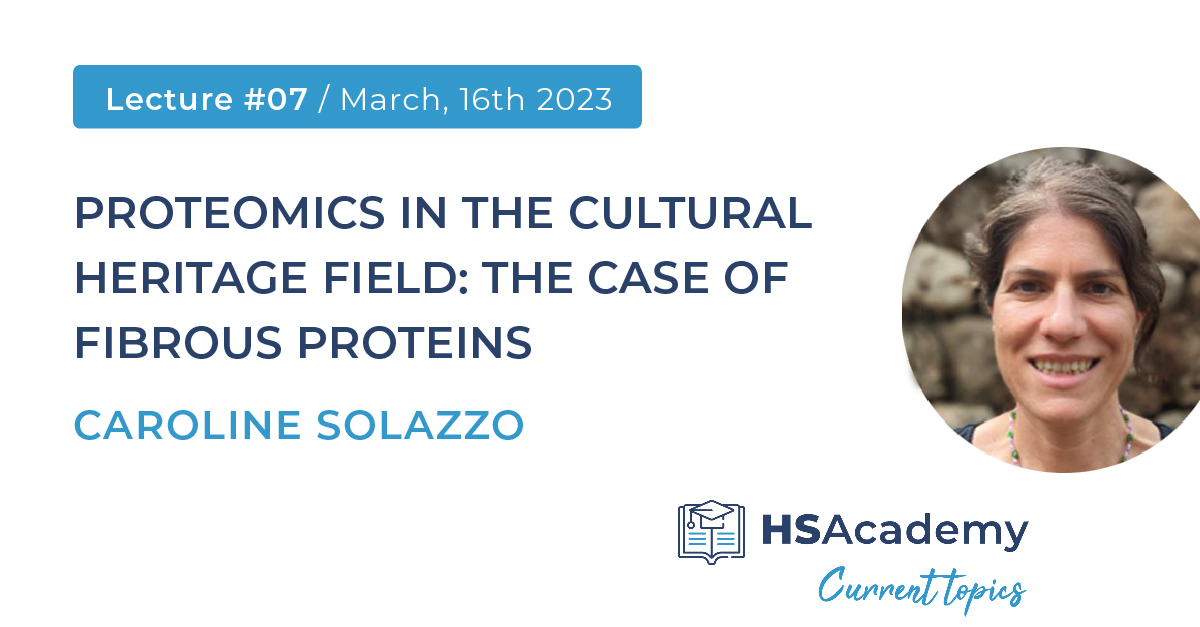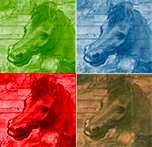
CTinHS Lecture #07: Proteomics in the cultural heritage field: the case of fibrous proteins
The CTinHS lectures are part of HS Academy: a collaborative initiative between IPERION HS (www.iperionhs.eu) and E-RIHS (www.e-rihs.eu). The two European projects integrate facilities of recognized excellence in Heritage Science, offering access to a wide range of high-level scientific instruments, methodologies, data, tools and training opportunities for advancing knowledge and innovation in the field.
Lecture #07 of the “Current Topics in Heritage Science” series will be delivered by Caroline Solazzo (Museum Conservation Institute, Smithsonian Institution) on Thursday, March 16th, at 3 pm (Rome time).
Abstract
Proteomics is a growing discipline in cultural heritage studies. It has found many applications for the identification of proteinaceous media such as binders and is becoming an important analytical tool in the study of animal-based documents and textiles. Fibrous proteins are highly-organized structural proteins forming filaments or sheets, providing strength and resistance. They include collagens, keratins and fibroins found in skin, hair and silk that make up many types of cultural objects. Species identification is often the main reason to use proteomics on animal fibre or skin, especially for difficult archaeological samples where visual examination is not conclusive. But, while fibrous proteins are ubiquitous in cultural heritage, they are also highly perishable. Proteomics offers new tools for curators and conservators to better understand the composition and degradation of these artefacts. Access to instrumentation, the development of protocols adapted to ancient proteins and the creation of targeted databases are common challenges in the field of cultural heritage proteomics. This lecture will review current proteomics and mass spectrometric techniques used for the study of fibrous proteins, in particular as used in historical textiles and garments.
Date
March 16th, 2022 at 3 pm (Rome time zone)
Duration
45 minutes (30 minutes + 15 minutes Q&A)
You will learn
- Principles of proteomics and mass spectrometry
- Structural proteins: keratin and collagen
- Applications
Key topics we’ll cover
- Proteins in cultural heritage
- Animal fibers in archaeological textiles
- Leather and other collagenous tissues
- Species identification and degradation
Speaker
Dr. Caroline Solazzo is a proteomics scientist specialized in the study of ancient protein products in material culture, in particular keratin-based tissues. She obtained her PhD in analytical chemistry from the University of Lille in France in collaboration with the Smithsonian Institution, where she worked on the early development of proteomics techniques for the study of ancient proteins, in particular animal fibers. She conducted post-doctoral studies at BioArCh at the University of York, and AgResearch in New Zealand thanks to a Marie Curie International fellowship, where she conducted research on wool for applications to ancient textiles. In 2012, she returned to the Smithsonian Institution as part of the new Proteomics and Biomolecular Mass Spectrometry Laboratory team.
